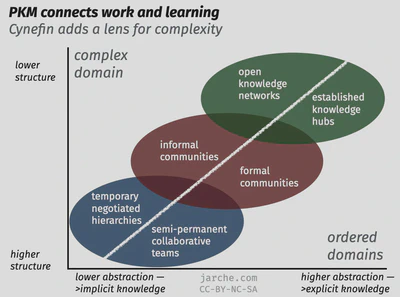Yesterday I wrote my first impressions triggered by Elizabeth Ayer’s “Meetings are the work”.
On further reflection I think Elizabeth’s hypothesis is necessary but not sufficient in a mission to truly improve organisational learning and the state of knowledge work within companies.
To make that point I am going to lean heavily on Harold Jarche’s model of Learning in the Complex Domain, and specifically the distinctions in this diagram:

Reading between the lines of Elizabeth’s post and profile, I think the experience on which she bases her thesis is the US tech industry. I have no experience of working in that environment, so I fully acknowledge that my response contains some assumptions. Based on my own experience in a large and complex organisation her position on the attitude to meetings and the common dysfunctions of meetings rings true, as do her suggestions about how to make meetings generative of knowledge. However my sense is that we are still talking about interactions that lie towards the bottom left of the figure, either “semi-permanent collaborative teams” or “temporary negotiated hierarchies”.
To fully realise the value of collective learning to the benefit of both the individuals and the company we need to augment the learning with community and network layers. Large companies may support communities of practice where professionals of different skill sets can exchange ideas, but how much is that in tension with a tightly-managed Tayloristic division of work?
Moving on towards the top-right of the diagram how much do large companies permit or facilitate their professionals to spend time in wider knowledge networks? In the tech sphere a useful proxy indicator might be the numbers of staff who are allowed to particpate in open source initiatives? (caveat, 2018 figures) In so far as those companies make such policies public it might be interesting to survey the IP policies they impose on staff before permitting them to engage with open source projects.
#100DaysToOffload 23/100